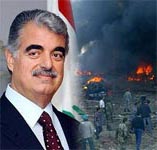Hariri case to be decided in former Dutch secret-service gym
 The Hague - Days before the official opening of the Special Tribunal for Lebanon, its main court room still looks the way it did when the UN staff took over the building: A gymnasium.
The Hague - Days before the official opening of the Special Tribunal for Lebanon, its main court room still looks the way it did when the UN staff took over the building: A gymnasium.
The green sports floor with typical yellow, white and red lining is still there, as is other standard gym equipment.
"Builders will start the transformation of this hall in the coming months," Peter Wickwire Foster, spokesman of the Special Tribunal for Lebanon told reporters during a press briefing in the week before the tribunal's official opening set for Sunday March 1.
In the coming years, the international court, established by the United Nations in 2007 upon Lebanon's request, will prosecute those allegedly responsible for the assassination of former Lebanese president Rafik Hariri on February 14, 2005.
In the event, the tribunal is authorized to prosecute any terror attack "between 1 October 2004 and 12 December 2005 of a nature and gravity similar to the attack of 14 February 2005," as its official UN-mandate reads - in other words, any seemingly politically motivated attack relating to the activity of Syria in Lebanese politics.
Some 305 staff members aree due to arrive in the Dutch municipality of Leidschendam-Voorburg, just outside The Hague in the next weeks, according to spokesman Wickwire Foster. The court's website, put up in haste, was currently being transformed and would be up and running by the end of the month, he added.
Court registrar Robin Vincent, however, said he hoped the tribunal would be in full force and ready to start its work within several months.
"We have a budget of 51.4 million dollars, 49 per cent of which comes from Lebanon, and the remainder has been pledged by the UN's Management Committee that supports this tribunal," British-born Vincent told reporters.
He added that the funding for 2009 had been settled, and that he had good hope next year's funding could also be arranged swiftly.
Such are the logistical arrangements of international justice.
The Lebanon tribunal is unusual amongst The Hague's bodies of international law - which include the International Court of Justice, the International Criminal Court, and the International Criminal Tribunal for the former Yugoslavia.
Unlike these courts, the Lebanon tribunal will operate under a hybrid system of the Lebanese criminal code and with a mixed Lebanese-international judiciary.
The hybrid nature of the judiciary was stipulated by the Lebanese government in the request that it submitted to the UN, when asking for the creation of such a tribunal to process the Hariri case - something practically unimaginable on Lebanese soil, given the case's political sensitivity.
The Chief Prosecutor of the Tribunal is Canadian Daniel Bellemare, who is currently preparing a formal request for the transfer of four former Lebanese military generals suspected of complicity in the Hariri killing.
In addition, the tribunal will be the first international court formally to incorporate a defence office in its structure. The defence team, which will operate independently, is located on the court's premises. The court is also set to implement a legal aid programme to ensure all suspects receive a proper defence.
Although using the Lebanese criminal code, the tribunal will not apply related punishments such as the death penalty or hard labour.
Until December 2007, the building now used by the tribunal was the home of the Dutch intelligence service. As the service hired substantially more staff following the September 11, 2001 attacks in New York, it was eventually forced move elsewhere.
In November 2007, the Dutch government formally informed the UN it was prepared to host the tribunal in The Hague, offering the building in Leidschendam-Voorburg.
The former headquarters of the Dutch intelligence service could hardly be located in a more neutral, unexciting area: An undefined mixture of 1970s commercial high-rise buildings and a dull residential estate.
Just the place, perhaps, to investigate the highly emotive issue of political assassinations on the streets of Beirut. (dpa)